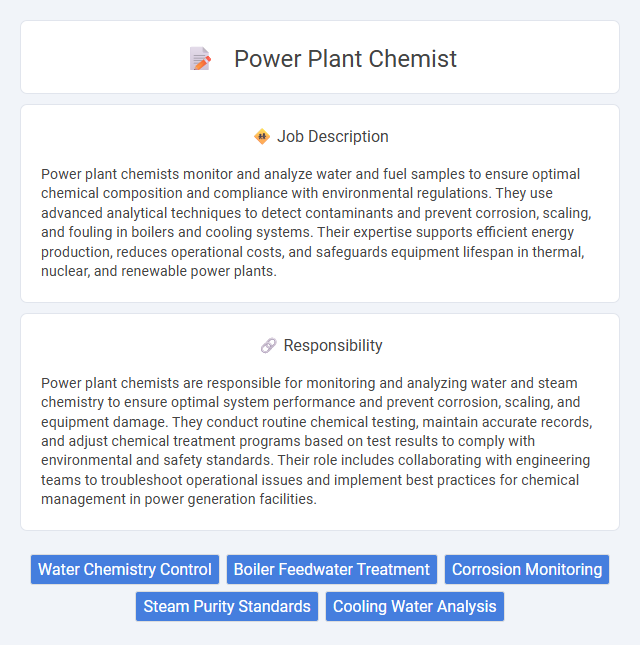
Power plant chemists monitor and analyze water and fuel samples to ensure optimal chemical composition and compliance with environmental regulations. They use advanced analytical techniques to detect contaminants and prevent corrosion, scaling, and fouling in boilers and cooling systems. Their expertise supports efficient energy production, reduces operational costs, and safeguards equipment lifespan in thermal, nuclear, and renewable power plants.
Individuals with strong analytical skills and attention to detail are likely to be well-suited for a power plant chemist role due to the necessity of monitoring water and chemical processes to ensure safety and efficiency. Those comfortable with working in industrial environments and handling potentially hazardous materials may find this job appropriate, while individuals sensitive to such conditions might struggle. It is probable that candidates with a background in chemistry and a high tolerance for routine testing and problem-solving will thrive in this position.
Qualification
A power plant chemist must possess a bachelor's degree in chemistry, chemical engineering, or a related field, with extensive knowledge of water treatment processes, corrosion control, and waste management within power generation systems. Proficiency in analytical techniques such as spectrophotometry, chromatography, and titration is essential to monitor and optimize chemical parameters in boiler water, cooling systems, and fuel quality. Certifications in industrial safety, environmental regulations, and experience with power plant-specific chemical analysis software enhance job performance and compliance adherence.
Responsibility
Power plant chemists are responsible for monitoring and analyzing water and steam chemistry to ensure optimal system performance and prevent corrosion, scaling, and equipment damage. They conduct routine chemical testing, maintain accurate records, and adjust chemical treatment programs based on test results to comply with environmental and safety standards. Their role includes collaborating with engineering teams to troubleshoot operational issues and implement best practices for chemical management in power generation facilities.
Benefit
Power plant chemist positions likely offer significant benefits such as competitive salaries and comprehensive health insurance plans. Employees may receive opportunities for professional development and certifications that enhance their expertise in water treatment and environmental compliance. There is a strong probability of job stability within the energy sector due to continual demand for skilled chemists to maintain operational efficiency and safety.
Challenge
Power plant chemist jobs likely involve complex challenges related to maintaining water quality and preventing corrosion within the plant's systems. Balancing chemical treatments to optimize efficiency while minimizing environmental impact is probably a critical aspect of the role. The position may demand staying current with evolving regulations and technological advancements to effectively address operational and safety concerns.
Career Advancement
A power plant chemist plays a crucial role in monitoring and maintaining water and fuel quality to ensure optimal plant performance and compliance with environmental regulations. Advancing in this career often involves gaining expertise in analytical techniques, process optimization, and regulatory standards, which can lead to senior chemist or environmental compliance specialist positions. Professional certifications and continuous education in chemical engineering or environmental science further enhance opportunities for leadership roles within power generation facilities.
Key Terms
Water Chemistry Control
A power plant chemist specializing in water chemistry control monitors and adjusts the chemical properties of boiler feedwater, cooling water, and condensate to prevent corrosion, scaling, and fouling within the plant's systems. Utilizing analytical techniques like pH measurement, conductivity, and ion chromatography ensures optimal water quality, maximizing efficiency and equipment lifespan. Maintaining strict compliance with environmental and safety regulations minimizes operational risks and supports sustainable plant performance.
Boiler Feedwater Treatment
A power plant chemist specializing in boiler feedwater treatment ensures the quality and purity of water used in boilers, preventing corrosion, scale buildup, and equipment failure. They analyze chemical properties, monitor water parameters like pH, hardness, and oxygen content, and adjust treatment chemicals such as oxygen scavengers and scale inhibitors. Maintaining optimal boiler feedwater chemistry enhances plant efficiency, reduces downtime, and extends the lifespan of critical components.
Corrosion Monitoring
Power plant chemists specializing in corrosion monitoring analyze water and steam chemistry to prevent equipment degradation and extend operational life. They utilize advanced techniques such as electrochemical analysis and deposit assessment to detect corrosion rates and identify potential threats to turbines, boilers, and condensers. Proactive corrosion monitoring ensures optimal efficiency, reduces maintenance costs, and enhances plant safety by maintaining controlled water chemistry conditions.
Steam Purity Standards
Power plant chemists ensure steam purity standards by monitoring and analyzing water and steam samples to prevent contamination that can cause turbine damage. They employ advanced techniques such as ion chromatography and conductivity measurements to maintain chemical balance and comply with industry standards like ASTM D1066. Maintaining strict steam purity is critical for operational efficiency and extending the lifespan of high-pressure steam turbines.
Cooling Water Analysis
Power plant chemists specializing in cooling water analysis monitor and control the chemical composition of water used in cooling systems to prevent corrosion, scaling, and biological growth. They conduct regular sampling and testing for parameters such as pH, conductivity, hardness, and biocide levels to ensure optimal performance and regulatory compliance. Effective cooling water treatment extends equipment lifespan, improves thermal efficiency, and reduces environmental impact.
 kuljobs.com
kuljobs.com